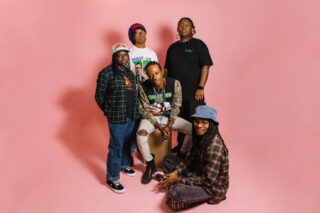LA hardcore punks Zulu: “I’m hoping people look at us the way I looked at Bad Brains”
Powerviolence which samples Curtis Mayfield and wants to bring people together

Powerviolence which samples Curtis Mayfield and wants to bring people together
Ever wondered what SZA might sound like hanging out in a hardcore bar? Or how the smooth tones of Nina Simone hold their own next to the abrasiveness of a guttural deathgrowl? Wonder no longer. As mastermind behind Zulu, the hottest new hardcore band out of LA, Anaiah Lei is intent on proving that all of this music has equal artistic value, and that it can live together in holistic ways.
“This is where the irony kicks in,” he says with a laugh. “While I’ve made this band in this image, it is still a heavy band; people mosh and get violent. But then in the midst of that chaos, I’ll put on a dancehall sample and people will still be like, ‘Oh snap’. You have a mix between these tough people that want to beat people up and these alternative kids that are totally new to the scene but love Zulu. I don’t know how it works, but somehow this band brings all kinds of people together.”
To unite the masses Lei had to learn about cultural critique. Where most kids discover alt-rock in a period of teenage angst, Lei’s parents were already well-versed in both reggae and punk, passing a sense of social consciousness down to their children.
“Punk kids grow up with a different outlook; I’m pretty sure I’ve seen little kids at local shows saying ‘I hate all fascists!’ before they even know what the word means,” says Lei. ”You’re radicalised a lot younger, you grow up aware.”
Having spent years on the road as a drummer in numerous bands – The Bots, Culture Abuse, Fireburn, DARE – Zulu began as an entirely solo work, a way for Lei to have a more empowered voice. Initially, he was aiming for a sound like “The Blue Nile, ’80s adult contemporary fusion. But I ended up landing on this variant of powerviolence.”
The appeal of powerviolence, Lei says, is its emphasis on pace: super-fast riffs into slower parts, loose structures and hyper-short songs: “A space where I could say what I wanted to say lyrically, without saying a lot.” Where Zulu do say plenty though, is in their samples, throwing in the kind of unexpected genre-shifts that force the audience to take pause, challenging the notion of borders and what is ‘expected’ from Black artists who sing about the politics of race.
“I’m a firm believer that individuals from our community shouldn’t have to be teachers to people,” he nods. “But at the same time as it being about avoiding limits, it’s just us bringing stuff in that we genuinely like: soul, reggae, R&B. Why not hit the boogie sometimes?”
With a live band now fully in place (Zaine Drayton on bass, Braxton Marcellous and Dez Yusuf on guitars, Christine Cadette on drums) Zulu’s debut album A New Tomorrow strives for duality, balancing open frustration with a sense of hope. Inspired by the music video for A Tribe Called Quest’s ‘Scenario’ (and featuring Soul Glo’s Pierce Jordan, Playytime’s Obioma Ugonna and noted Zulu fan, comedian Eric Andre) lead single ‘Where I’m From’ makes this message of celebration clear: “We been here / And we ain’t going nowhere.” Elsewhere, ‘Music To Drive By’ shapes big riffs around a Curtis Mayfield sample, talking about the normalcy of the drive-by shootings that Lei grew up hearing in LA.
“It’s not a story you tend to hear outside of hip-hop, and even then people will say you’re trying to glorify it,” says Lei. “But there’s a lot of people killing each other even within the Black community, and a big theme of the record is the idea that we really need to come together and start somewhere.”
From here on in, Zulu’s fight for communal recognition should grow wings. Whether they’re moshers, activists or music fans simply curious to see how on earth this all plays out live, Lei maintains that this is a project for Black kids to see themselves in, to know that they are actively welcome in this scene.
“When I started this band it was a side project that I started alone, from a place of crippling depression, not really feeling listened to in the bands I was in. And now it’s the only band I play in that a lot of people like,” he smiles. “I’m hoping that years from now, people can look at Zulu in the same way I looked at Bad Brains. That would make me very, very happy.”
Photography by Alice Baxley